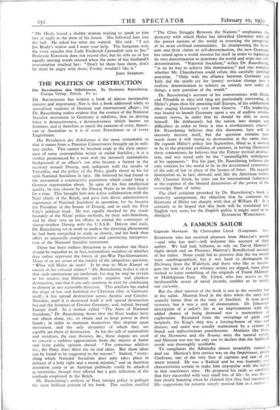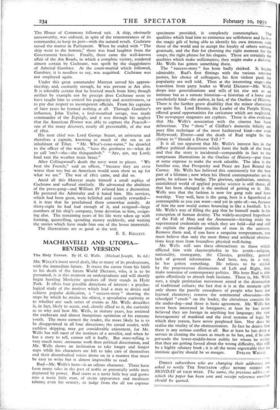A FAMOUS SAILOR
Captain Marryat. By Christopher Lloyd. (Longmans. 15s.) EVERYONE who has received pleasure from Marryat's novels —and who has not?—will welcome this account of their author. We had had, hitherto, to rely on David Hannay's slight sketch and on Florence Marryat's Bowdlerised account of her father. None could fail to perceive that the sea novels were autobiographical; but it was hard to distinguish the Dichtung from the Wahrheif, and those who like to investi- gate the hole of the pit whence stories are digged, have often wished to learn something of the originals of Frank Mildinay or Midshipman Easy. Mr. Lloyd, who has access to the inexhaustible stores of naval records, enables us to satisfy our curiosity.
But the chief interest of the book is not in the novelist hut in the sailor. Marryat lived in the days when the navy was scarcely better than in the time of Smollett. It won great victories, but it was a sink of abomination. Dr. Johnson's description of a sailor's life as an imprisonment with the added chance of being drowned was a masterpiece of euphemism. Recruited from the sweepings of gaols and hospitals, the King's ship was a forcing-house of vice and disease; and order was usually maintained by a system of brutal and indiscriminate punishments. Mutinies like those of the Hermione and the Bounty were the natural result; and Marryat was not the only one to declare that the Spithead revolt was thoroughly justifiable.
To complaints the Admiralty almost invariably turned a deaf ear. Marryat's first service was on the imperieuse, under Cochrane, one of the very best of captains and one of the worst treated. He was a Radical and he was humane; t%;. characteristics certain to make him unpopular with the ruleis in that reactionary time. He prepared his raids so carefully that they succeeded with very small loss of life : he was ther -- fore clearly boasting when he claimed that they had succeed:J. His suggestions for reforms simply marked him as a nuisan.--
The House of Commons followed suit. A ship, obviously unseaworthy, was ordered, in spite of the remonstrances of its commander, to keep its post—with the natural result. Cochrane raised the matter in Parliament. When he ended with "The ship went to the bottom," there was loud laughter from the Government benches. Finally, there came the well-known affair of the Aix Roads, in which a complete victory, rendered almost certain by Cochrane, was spoilt by the sluggishness of Admiral Gambier. At the court-martial which followed, Gambier, it is needless to say, was acquitted. Cochrane was not employed again.
Under this great commander Marryat served his appren- ticeship, and, curiously enough, he was present at Aix also. It is tolerably certain that he learned much from him; though neither by example nor by precept does Cochrane seem to have taught him to control his pugnacity and assertiveness, or to pay due respect to incompetent officials. From his captains of later years he learned nothing at all. Through Gambier's influence, John Taylor, a foul-mouthed savage, was made commander of the Espiegle, and it was through his neglect that the American Hornet was able to capture the Peacock— one of the many disasters, nearly all preventable, of the war of 1812.
His next chief was Lord George Stuart, an aristocrat and therefore a captain, knowing as much of the sea as an inhabitant of Tibet. "Mr. What's-your-name," he drawled to the officer of the watch, "have the goodness to—what do ye call 'em?—the—the thingumbob." "Aye, aye, my Lord; haul taut the weather main brace."
After Collingwood's death the navy went to pieces. "We beat the French," said an officer, "because they are even worse than we; but an American would soon show us up for what we are." The war of 1812 came, and did so.
Amid all this Marryat made himself a small replica of Cochrane and suffered similarly. He advocated the abolition of the press-gang—and William IV refused him a decoration. He pestered the Admiralty and it hated him. His services, which had been great, were belittled and scantily rewarded— it is true that he proclaimed them somewhat noisily. At thirty-eight he had had enough of it, and resigned—large numbers of his ship's company, from devotion to him, resign- ing also. The remaining years of his life were taken up with farming, quarrelling, spending money recklessly, and writing the stories which have made him one of the lesser immortals.
The illustrations are as good as the text.
E. E. KELLETT.















































 Previous page
Previous page